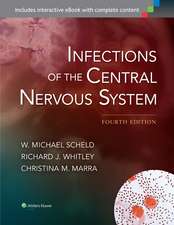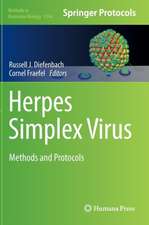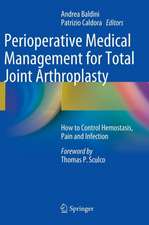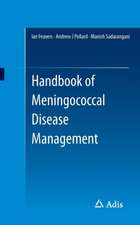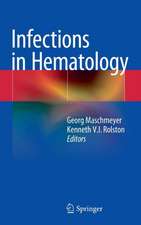Infectious Diseases and Rural Livelihood in Developing Countries
Autor Fingani Annie Mphandeen Limba Engleză Paperback – 14 mar 2019
| Toate formatele și edițiile | Preț | Express |
|---|---|---|
| Paperback (1) | 710.96 lei 43-57 zile | |
| Springer Nature Singapore – 14 mar 2019 | 710.96 lei 43-57 zile | |
| Hardback (1) | 717.56 lei 43-57 zile | |
| Springer Nature Singapore – 22 feb 2016 | 717.56 lei 43-57 zile |
Preț: 710.96 lei
Preț vechi: 748.38 lei
-5% Nou
Puncte Express: 1066
Preț estimativ în valută:
136.04€ • 142.42$ • 112.57£
136.04€ • 142.42$ • 112.57£
Carte tipărită la comandă
Livrare economică 07-21 aprilie
Preluare comenzi: 021 569.72.76
Specificații
ISBN-13: 9789811091599
ISBN-10: 9811091595
Pagini: 187
Ilustrații: XV, 187 p. 21 illus. in color.
Dimensiuni: 155 x 235 mm
Greutate: 0.3 kg
Ediția:Softcover reprint of the original 1st ed. 2016
Editura: Springer Nature Singapore
Colecția Springer
Locul publicării:Singapore, Singapore
ISBN-10: 9811091595
Pagini: 187
Ilustrații: XV, 187 p. 21 illus. in color.
Dimensiuni: 155 x 235 mm
Greutate: 0.3 kg
Ediția:Softcover reprint of the original 1st ed. 2016
Editura: Springer Nature Singapore
Colecția Springer
Locul publicării:Singapore, Singapore
Cuprins
Chapter 1: Poverty, Health and Livelihoods.- Chapter 2: Rural Livelihood.- Chapter 3: Infectious Diseases.- Chapter 4: Infectious Diseases and Livelihoods.- Chapter 5: Transportation.- Chapter 6: Healthcare.- Chapter 7: Surveillance.- Chapter 8: Disease Awareness and Prevention.- Chapter 9: Infectious Disease Management Strategies.- Chapter 10: Way Forward.- Bibliography.- Index.
Notă biografică
Fingani Mphande is a molecular biologist and a microbiologist who works on public health and infectious disease issues in developing countries. She has worked in international research laboratories in Africa, Europe and the South pacific focusing on infectious disease spread, prevention and management for over 10 years. During this time she has gained ample knowledge in public health issues affecting developing countries. Her work focuses on linking communities, scientists and health personnel regarding public health and infectious diseases. This includes drafting policies on infectious disease management and control, public health awareness on the epidemiology of infectious diseases, and dissemination of relevant public health information to media and communities. Fingani Mphande currently works as an independent consultant in Public Health, Infectious Disease and Molecular Biology. She has worked with infectious diseases including malaria, studying the parasite-host interactions anddengue fever, studying the vector-host interaction and vector management. She has annotated part of the Plasmodium genomes and also worked as a trainer in international workshops ‘Working with Pathogen Genomes’ with the Wellcome Trust Sanger Institute. During her career she has authored papers in peer reviewed journals and has written and translated material regarding public health in the work place and in the community. She completed her PhD in infection biology from Karolinska Institutet, Sweden and holds a Master of Science degree from University of Botswana. She completed he undergraduate degree in biology and chemistry from the University of Malawi, Chancellor College.
Textul de pe ultima copertă
This book focuses on the effects of rural livelihood and the impact of infectious diseases on health and poverty. It explores cultures and traditions in developing countries and their role in infectious-disease management and prevention. It highlights the associated healthcare systems and how these have contributed to some of the challenges faced, and goes on to elaborate on the significance of community involvement in infectious-disease prevention, management and control. It also emphasizes the importance of surveillance and setting up strategies on infectious-disease management that are favourable for poor communities and developing countries. Infectious Diseases and Rural Livelihood in Developing Countries allows students, researchers, healthcare workers, stakeholders and governments to better understand the vicious cycle of health, poverty and livelihoods in developing countries and to develop strategies that can work better in these regions.
Caracteristici
Approaches infectious-disease management with a focus on health, rural livelihood and poverty in developing countries Focuses on how the lack of resources and poor management of infectious diseases can have catastrophic outcomes with reference to the 2014 Ebola outbreak in West Africa Suggests infectious-disease control and management strategies that are favourable for developing countries and poor communities Includes supplementary material: sn.pub/extras






